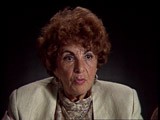<< Previous | Displaying results 61-70 of 571 for "" | Next >>
-
Helen Lebowitz Goldkind describes German humiliation of her grandfather in the Uzhgorod ghetto
Oral HistoryIn 1938-39, Hungary annexed the area of Czechoslovakia in which Helen lived. After Germany occupied Hungary in 1944, Helen and her family were deported to the Uzhgorod ghetto. As Jews, they were soon transferred to various camps, where much of the family perished. Although at times Helen was too weak to walk, she and her older sister survived Auschwitz, forced labor at a camp munitions factory, and Bergen-Belsen.
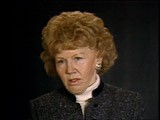
-
Barbara Marton Farkas describes deportation from Hungary to Auschwitz
Oral HistoryBarbara was born in the province of Arad in northern Transylvania, Romania. She went to school until the Hungarian army occupied the area in 1940 and she was no longer allowed to attend. After the Germans occupied Hungary in 1944, discrimination against Jews intensified. Barbara and her family were forced into the Oradea ghetto. She worked in the ghetto hospital until she was deported to the Auschwitz camp. At Auschwitz, she worked in the kitchens to receive extra food. She was deported to another camp,…
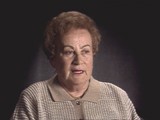
-
Rifka Muscovitz Glatz describes emotions surrounding the establishment of the state of Israel
Oral HistoryRifka was raised in a religious family in Debrecen. In the early 1940s, her family moved to Cluj (Kolozsvar) in Northern Transylvania, annexed to Hungary from Romania in 1940. In 1944, she and her family were forced to leave their house in Cluj. They were rounded up by Hungarian troops helping the Nazis and taken to a brick factory where they stayed for a month. In June 1944, Rifka was transported to the Bergen-Belsen concentration camp. Eight months later she was transported to Switzerland. She sailed to…

-
Leah Hammerstein Silverstein describes the Tarnow ghetto after a roundup
Oral HistoryLeah grew up in Praga, a suburb of Warsaw, Poland. She was active in the Ha-Shomer ha-Tsa'ir Zionist youth movement. Germany invaded Poland in September 1939. Jews were forced to live in the Warsaw ghetto, which the Germans sealed off in November 1940. In the ghetto, Leah lived with a group of Ha-Shomer ha-Tsa'ir members. In September 1941, she and other members of the youth group escaped from the ghetto to a Ha-Shomer ha-Tsa'ir farm in Zarki, near Czestochowa, Poland. In May 1942, Leah became a courier…
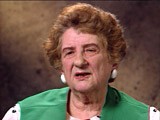
-
Thomas Buergenthal describes an emigration operation in an orphanage in postwar Germany
Oral HistoryThomas's family moved to Zilina in 1938. As the Slovak Hlinka Guard increased its harassment of Jews, the family decided to leave. Thomas and his family ultimately entered Poland, but the German invasion in September 1939 prevented them from leaving for Great Britain. The family ended up in Kielce, where a ghetto was established in April 1941. When the Kielce ghetto was liquidated in August 1942, Thomas and his family avoided the deportations to Treblinka that occurred in the same month. They were sent…
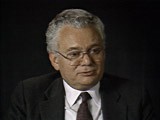
-
Fela Warschau describes reading lists of names to find surviving family members
Oral HistoryFela was liberated at Bergen-Belsen by the British army in 1945. She went to a displaced persons (DP) camp administered by the Americans in Feldafing, near Munich. She married in the DP camp in 1946, and eventually immigrated to the United States.
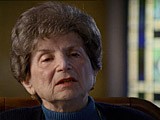
-
Fela Warschau describes the Feldafing displaced persons camp
Oral HistoryFela was liberated at Bergen-Belsen by the British army in 1945. She went to a displaced persons (DP) camp administered by the Americans in Feldafing, near Munich. She married in the DP camp in 1946, and eventually immigrated to the United States.
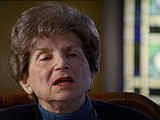
-
Steven Springfield describes the treatment of Jews in the Riga ghetto
Oral HistoryThe Germans occupied Riga in 1941, and confined the Jews to a ghetto. In late 1941, at least 25,000 Jews from the ghetto were massacred at the Rumbula forest, near Riga. Steven and his brother were sent to a small ghetto for able-bodied men. In 1943 Steven was deported to the Kaiserwald camp and sent to a nearby work camp. In 1944 he was transferred to Stutthof and forced to work in a shipbuilding firm. In 1945, Steven and his brother survived a death march and were liberated by Soviet forces.

-
Steven Springfield describes a massacre in the Rumbula forest near Riga, Latvia
Oral HistoryThe Germans occupied Riga in 1941, and confined the Jews to a ghetto. In late 1941, at least 25,000 Jews from the ghetto were massacred at the Rumbula forest, near Riga. Steven and his brother were sent to a small ghetto for able-bodied men. In 1943 Steven was deported to the Kaiserwald camp and sent to a nearby work camp. In 1944 he was transferred to Stutthof and forced to work in a shipbuilding firm. In 1945, Steven and his brother survived a death march and were liberated by Soviet forces.
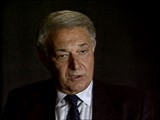
-
Lily Mazur Margules describes the dehumanization she felt in the Kaiserwald camp
Oral HistoryLily was forced into a ghetto after the Germans occupied Vilna in 1941. She was forced to work until the liquidation of the ghetto in 1943 when she was deported to the Kaiserwald camp near Riga, Latvia. From there she was sent to work in the Duenawerke labor camp. She was deported by ship across the Baltic Sea to the Stutthof camp and was taken to a nearby labor camp. Lily was liberated during a death march which ended in the town of Krumau, East Prussia, in 1945.
